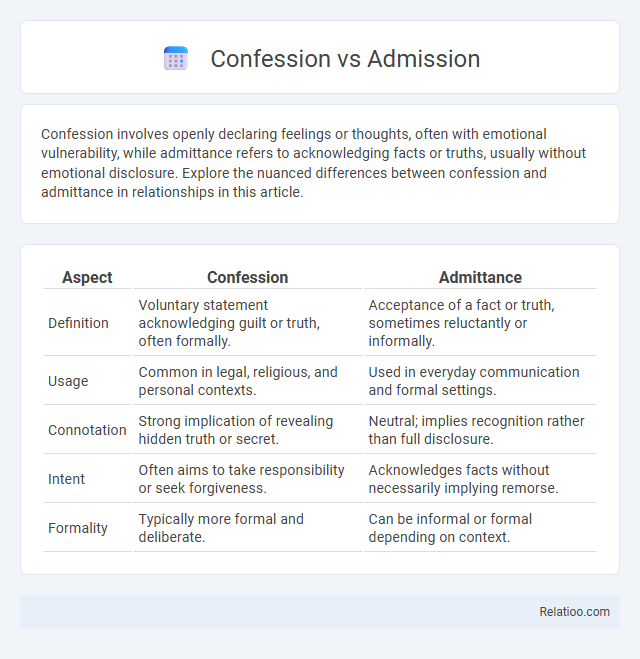Confession involves openly declaring feelings or thoughts, often with emotional vulnerability, while admittance refers to acknowledging facts or truths, usually without emotional disclosure. Explore the nuanced differences between confession and admittance in relationships in this article.
Table of Comparison
| Aspect | Confession | Admittance |
|---|---|---|
| Definition | Voluntary statement acknowledging guilt or truth, often formally. | Acceptance of a fact or truth, sometimes reluctantly or informally. |
| Usage | Common in legal, religious, and personal contexts. | Used in everyday communication and formal settings. |
| Connotation | Strong implication of revealing hidden truth or secret. | Neutral; implies recognition rather than full disclosure. |
| Intent | Often aims to take responsibility or seek forgiveness. | Acknowledges facts without necessarily implying remorse. |
| Formality | Typically more formal and deliberate. | Can be informal or formal depending on context. |
Understanding Confession and Admittance
Confession involves explicitly acknowledging guilt or responsibility for an action, often in a formal or legal context. Admittance, on the other hand, refers to conceding a fact or truth without necessarily accepting guilt, which can influence legal or interpersonal outcomes significantly. Understanding the distinction between confession and admittance helps You navigate situations where acknowledging facts impacts accountability and trust.
Defining Confession: Key Characteristics
Confession involves a voluntary acknowledgment of guilt or responsibility for a specific act, often providing detailed information about the offense. It is characterized by its explicitness, sincerity, and the intention to accept accountability, distinguishing it from mere admittance, which may only acknowledge certain facts without full acceptance of guilt. A confession typically plays a crucial role in legal contexts as substantive evidence, whereas admittance might be limited to recognizing certain circumstances without fully implicating oneself.
What is Admittance? An Overview
Admittance refers to the voluntary acknowledgment of a fact or truth in legal and everyday contexts, often relevant in court procedures where a party accepts certain evidence or claims without dispute. Unlike a confession, which involves admitting guilt or wrongdoing, admittance can pertain to acknowledging any fact that supports the case without implying fault. Understanding your role in providing admittance can influence the outcome of legal proceedings by streamlining the issues that need to be proven or contested.
Psychological Motivations: Why People Confess
Confession involves voluntarily revealing a truth, often driven by guilt reduction and the need for emotional relief, while admittance typically refers to acknowledging facts or responsibilities with less emotional weight. Psychological motivations behind confession include seeking forgiveness, alleviating cognitive dissonance, and restoring self-integrity after wrongdoing. Admittance, on the other hand, may occur due to external pressures or evidence, lacking the intrinsic emotional drive that characterizes confession.
Social Contexts of Admittance
Confession involves openly acknowledging a mistake or wrongdoing, often in legal or personal contexts, whereas admittance refers to the act of allowing entry or acknowledging a fact in social or formal settings. In social contexts, admittance plays a crucial role in inclusion, such as gaining access to exclusive groups, events, or institutions based on acceptance criteria or credentials. Understanding the nuances of admittance highlights the importance of social boundaries, permissions, and identity validation within community dynamics.
Legal Implications: Confession vs Admittance
Confession involves a full acknowledgment of guilt regarding a crime, often carrying significant legal consequences such as immediate criminal liability and potential for harsher sentencing. Admittance refers to acknowledging certain facts or involvement without fully accepting guilt, which might mitigate legal penalties or affect the direction of a case but does not constitute a formal guilty plea. Understanding the distinction is critical in legal contexts, as a confession can be used as direct evidence of guilt, whereas admittance may only influence case strategy or negotiations.
Confession in Religious and Cultural Settings
Confession in religious and cultural settings often involves a formal acknowledgment of sins or wrongdoings, serving as a spiritual cleansing process and a step toward redemption or forgiveness. Unlike admittance, which generally refers to accepting factual or legal responsibility, confession emphasizes personal accountability and moral reflection within a faith community. Many religious traditions, such as Catholicism's Sacrament of Penance, view confession as a vital practice that fosters humility, reconciliation, and ethical growth.
The Role of Evidence in Admittance
Confession involves voluntarily acknowledging guilt, while admittance refers to accepting facts without necessarily implying guilt. The role of evidence in admittance is crucial, as it validates the truthfulness of the statement and influences its legal weight in court proceedings. Evidence such as corroborating testimony or physical proof strengthens admittance, making it more credible and impactful during trials.
Impact on Relationships: Trust and Resolution
Confession involves openly revealing wrongdoing, often leading to increased trust and quicker resolution in relationships by demonstrating honesty and accountability. Admittance acknowledges a fact or fault but may lack the emotional depth of a confession, impacting trust moderately while still fostering some resolution. Your willingness to choose confession over mere admittance can strengthen relational bonds by promoting transparency and deeper emotional connection.
Choosing the Right Approach: Confession or Admittance
Confession involves openly acknowledging wrongdoing with full transparency, often carrying legal or moral implications, while admittance typically refers to recognizing facts or involvement without the emotional or ethical weight of confession. Choosing the right approach depends on the context: confession suits situations requiring accountability and trust restoration, whereas admittance is appropriate for factual acknowledgment without implying guilt. Understanding the nuances between these terms ensures effective communication and appropriate response in legal, interpersonal, or professional scenarios.

Infographic: Confession vs Admittance
 relatioo.com
relatioo.com